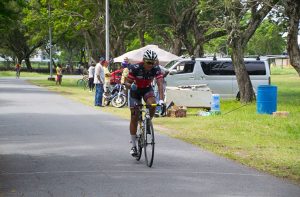THE woes of Guyanese cyclist Alanzo Greaves continue to climb, as he is now hit with the news that the Caribbean Regional Anti-doping Organisation’s (RADO) one-year ban for his 2015 positive doping test has now been extended to an overall four years, after the World Anti-Doping Agency (WADA) overturned the initial ruling. The Guyana Olympic Association (GOA) yesterday held a press conference at Olympic House to share the news that Caribbean RADO has accepted the decision handed down by the Court of Arbitration for Sports (CAS) that the “athlete should have been sanctioned with a four-year period of ineligibility rather than only one year”.
The ban means that for the period Greaves is ineligible from participating in any cycling events sanctioned by the International Cycling Union (ICU) or any of its affiliates thereof, including the Guyana Cycling Federation (GCF).
Greaves’ initial one-year ban from RADO was set to run from November 1, 2015 to November 1, 2016. However WADA felt the one-year ban was unconstitutional. WADA appealed the case on June 20, 2016.
As of January 1, 2015, the WADA code ruled that first-time offenders would be sanctioned with a ban of four years, with the exception that if an athlete can prove the doping was unintentional the ban could be relegated to “at a minimum, a reprimand and no period of ineligibility, and at a maximum, two years of ineligibility”.

RADO thought Greaves’ incidence could be ruled as unintentional; WADA did not believe there was evidence to support this.
Controversy first began for Greaves when his urine sample returned an Adverse Analytical Finding (AAF) for prohibited substance testosterone, after the Caribbean RADO carried out random tests on ten cyclists who participated in the `Tour of Guyana’ Five Stage road race which concluded on November 1, 2015.
Cyclists from Barbados, Colombia and Jamaica reportedly also had positive tests. This was Greaves’ first violation and he waived his right to have the ‘B’ sample analysed.
When the news broke, Greaves and other cyclists, denied the findings, saying they had not been contacted by RADO.
However, in a letter through his lawyer, Greaves admitted that while he did not himself take the drug intentionally, he knew prior to November 1 that the drug had been given to him.
A letter from Greaves attorney, Gordon Gilhuys, stated, in part, that Greaves “was informed by one of his friends, on October 31 2015, that another friend had put the drug Proviron in his glass”.
RADO felt this constituted that Greaves “lacked intention”. WADA did not agree.
“The athlete’s attempted explanation that the prohibited substance was ingested by him in ignorance in a “spiked drink” with Proviron by an unidentified “friend” was unparticularised and unsupported by any actual evidence whatsoever,” was the summarisation of WADA’s submission, as declared in the 12-page Arbitral Award issued by the CAS.
A press release issued by RADO explained that the new four-year period ban for Greaves would commence from January 5, 2017, but considering time already served Greaves will only have to sit out a further three years, which would see this ban end January 4, 2020.
The news comes just as Greaves was trying to recuperate from the blow of that one-year ban, and only days after he captured his first win of the 2017 season in the Ricks & Sari Agro Industries Ltd 24th Annual National Park Cycle Meet.





.jpg)








